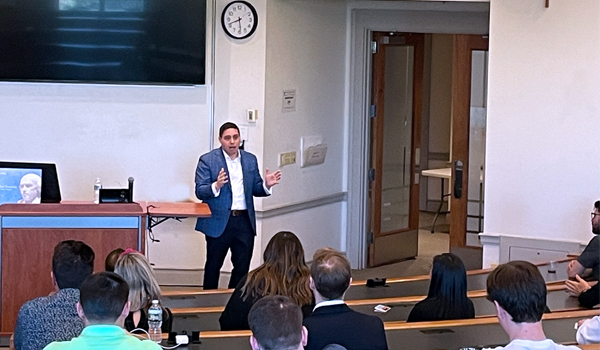 The Federalist Society for Law and Public Policy Studies at The Catholic University of America Columbus School of Law (Catholic Law) hosted Professor J. Joel Alicea, Co-Director of the Project on Constitutional Originalism and the Catholic Intellectual Tradition, the evening of Wednesday, April 12, 2023. Alicea discussed the future of the “tiers of scrutiny” method of constitutional analysis in light of the Supreme Court’s decision in New York State Rifle & Pistol Ass’n, Inc. v. Bruen. In his presentation, Alicea explained the tiers of scrutiny, arguing that, following Bruen, the Court will likely reject this method in other areas of constitutional law. He additionally provided reasons for why the Court, in his view, should continue rejecting the tiers of scrutiny.
The Federalist Society for Law and Public Policy Studies at The Catholic University of America Columbus School of Law (Catholic Law) hosted Professor J. Joel Alicea, Co-Director of the Project on Constitutional Originalism and the Catholic Intellectual Tradition, the evening of Wednesday, April 12, 2023. Alicea discussed the future of the “tiers of scrutiny” method of constitutional analysis in light of the Supreme Court’s decision in New York State Rifle & Pistol Ass’n, Inc. v. Bruen. In his presentation, Alicea explained the tiers of scrutiny, arguing that, following Bruen, the Court will likely reject this method in other areas of constitutional law. He additionally provided reasons for why the Court, in his view, should continue rejecting the tiers of scrutiny.
Alicea defined the tiers of scrutiny as part of a method of constitutional analysis focusing on legislative means and ends, and how these function in relation to the Constitution. As its name suggests, the method comprises three tiers: strict, intermediate, and rational basis. Each approaches a piece of legislation by investigating its ends—i.e., the interest which a state uses to justify passing such legislation—and the means chosen to achieve those ends. Alicea noted that this method developed recently relative to the history of American jurisprudence. He then offered various arguments against its usefulness and coherence, drawing from the amicus brief that he and his co-author John Ohlendorf submitted in Bruen and which Justice Kavanaugh cited favorably at oral argument. Alicea additionally analyzed what the Court said in Bruen regarding the tiers of scrutiny, likewise explaining why he believes that the Court, following various holdings in other cases of recent years, is moving away from this method across much of constitutional law.
The Federalist Society for Law and Public Policy Studies is a group of conservatives and libertarians interested in the current state of the legal order. It is founded on the principles that the state exists to preserve freedom, that the separation of federal powers is central to the Constitution, and that it is emphatically the province and duty of the judiciary to say what the law is, rather than what it should be. The event concluded with an extended Q&A from the audience, during which students actively asked questions. It was the Catholic Law Federalist Society’s last event of the 2022-2023 academic year.
